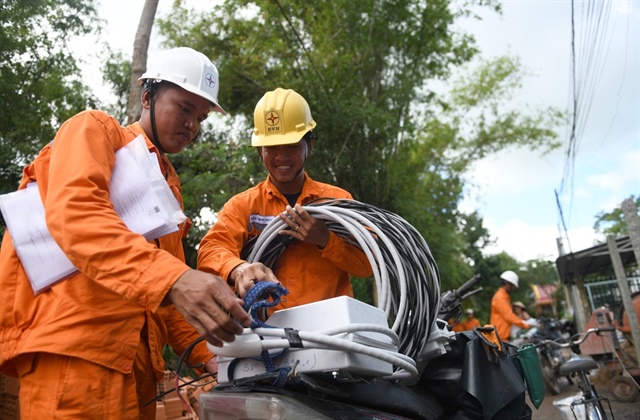The impact of geopolitical tensions has resulted in rising electricity procurement costs for EVN in the 2022-2023 period, leading to significant challenges. As a result, EVN reported accumulated losses of approximately VND 50,029 billion. By the end of 2024, the accumulated losses of the parent company, EVN, are expected to remain at around VND 44,792 billion, reducing state investment and failing to preserve state capital in the enterprise.
Consequently, EVN has proposed to the Minister of Industry and Trade to report to the Prime Minister for permission to consider these accumulated losses as an allowable expense in the average retail electricity price calculation.
This implies that electricity users will bear these losses through their electricity bills.
Dr. Huynh Thanh Dien from Nguyen Tat Thanh University shared his perspective on two possible scenarios for state intervention in this situation: First, the state can subsidize EVN’s losses. Second, the state can allow EVN to increase electricity tariffs.

After a 4.8% increase on May 10, the current average retail electricity price stands at 2,204.07 VND/kWh (excluding VAT). Photo: Hoang Giam |
According to Dr. Dien, it is essential to approach this issue with fairness. EVN is not a typical enterprise in a market economy where prices are determined by supply and demand. Instead, EVN has a monopoly on electricity distribution, and the state intervenes in pricing. Therefore, if the state does not allow EVN to increase tariffs, it should compensate for the losses through the budget.
“The state can agree to a partial tariff increase for EVN. The remaining loss can be subsidized by the state due to its intervention in electricity prices,” said the representative from Nguyen Tat Thanh University.
However, he also emphasized the need to audit EVN’s losses to ensure they are not a result of wastefulness or mismanagement. If the losses are due to unavoidable factors and the enterprise has practiced cost-saving measures to the fullest extent, state support is warranted. On the other hand, if the losses are a result of wastefulness, mismanagement, or poor management, they should be excluded from consideration.
| Indicators | 2020 | 2021 | 2022 | 2023 | 2024 |
| Net revenue from sales and provision of services | 323,492 | 330,224 | 373,187 | 405,466 | 479,835 |
| Cost of goods sold and services provided | 317,760 | 331,833 | 402,854 | 433,173 | 470,910 |
| Gross profit/loss from sales and provision of services | 5,732 | -1,588 | -29,667 | -27,707 | 8,924 |
Table: EVN’s business performance over the past five years. (in billions of VND, source: Financial Statements)
Sharing a similar viewpoint, Dr. Trinh Doan Tuan Linh, an Economics and Finance expert, stated that EVN is a unique enterprise. Its primary purpose is to contribute to the country’s socio-economic development.
“We cannot solely assess EVN’s performance based on profits or losses like other businesses. Sometimes, EVN may incur losses, but the value it brings to the economy is far greater. Therefore, being in the red is not necessarily the most critical aspect,” he remarked.
However, the state management agency should also determine if the losses are related to resource waste or mismanagement.
Dr. Linh analyzed that if EVN’s business operations suffered losses in 2022-2023 due to higher electricity procurement costs, leading to increased expenses, and EVN couldn’t adjust its tariffs freely like a typical market enterprise, it would inevitably face losses.
“If we divide the nearly VND 45,000 billion loss mentioned by EVN by the total annual electricity consumption nationwide, which is about 300 billion kWh, each kWh of electricity consumed would bear about 150 VND. If the state agency spreads this loss over multiple years, the allocated amount per kWh of electricity would be even lower,” he estimated. He further added that such an allocation would not be significant.
Additionally, compensating for EVN’s losses would provide the enterprise with additional resources to reinvest in electricity infrastructure in regions with underdeveloped electrical systems.
|
Regarding the Draft Decree amending and supplementing a number of articles of Decree No. 72/2025/ND-CP dated March 28, 2025, of the Government on the mechanism and time frame for adjusting the average retail electricity price, EVN proposed necessary amendments and supplements to this document. Specifically, EVN requested permission to recover costs directly related to electricity production and supply, which have not been fully calculated or compensated for in the average retail electricity price in the past, based on the announcement of electricity production and trading costs or audited financial statements. EVN argued that the average retail electricity price should address the timely recovery of costs for electricity units, contributing to the preservation and development of their business capital. Therefore, it is essential to develop a draft decree amending and supplementing Decree No. 72 to further improve the regulations on the mechanism and time frame for adjusting the average retail electricity price. |
Tran Chung















